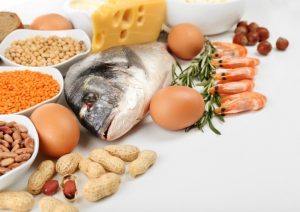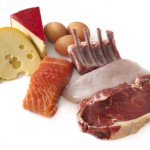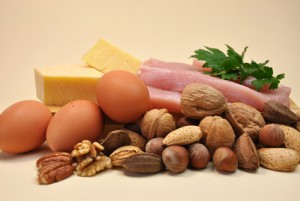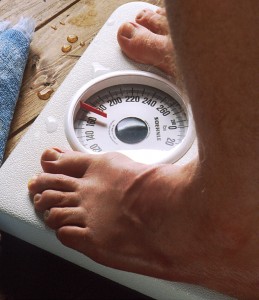What Kind Of Protein Is Best For You?
Author: Dr. Stephen Chaney
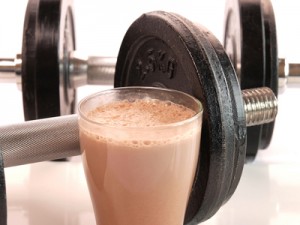 Every bodybuilder “knows” that whey is the best protein for building strong muscles. After all, it:
Every bodybuilder “knows” that whey is the best protein for building strong muscles. After all, it:
- Is absorbed more rapidly than some other proteins.
- Contains all nine essential amino acids.
- Is naturally rich in leucine, a branched chain amino acid that stimulates increased muscle mass.
However, as someone who is not a vegan but who follows the vegan literature, I frequently come across testimonials from bodybuilders and elite athletes who say they get all the strength and muscle mass they need from plant proteins.
I’ve always assumed they must have dietitians designing the perfect plant protein diet for them. But a recent study surprised me. It challenged that assumption.
Before I talk about this study, let me change our focus. Most of us will never be bodybuilders or elite athletes, but all of us face a common challenge. We all tend to lose muscle mass as we age, something referred to as sarcopenia. I have discussed this in a previous issue of “Health Tips From the Professor”.
Simply put, sarcopenia results in:
- Loss of muscle strength. Even the simple act of picking up a grandchild or a bag of groceries can become problematic.
- Increased risk of falls and fractures.
- Lower quality of life.
Sarcopenia is a major health issue for those of us in our golden years. If you are younger, it is a concern for your parents or grandparents. Sarcopenia is a health issue that affects everyone.
In my previous article I discussed the role of adequate protein intake and exercise in preventing age-related sarcopenia. But I did not discuss what kind of protein was best for preventing muscle loss, and the frailty that comes with it, as we age.
The article (EA Struijk et al, Journal of Cachexia, Sarcopenia and Muscle, 13: 1752-1761, 2022) I will discuss today suggests that plant protein is best for preventing frailty in women as they age. It’s a surprising conclusion, so join me as I evaluate this study.
How Was This Study Done?
 The data for this study came from the Nurses Health Study which started in 1976 with 121,700 women nurses and is still ongoing. This study followed 85, 871 female nurses for an average of 22 years starting when they were 60.
The data for this study came from the Nurses Health Study which started in 1976 with 121,700 women nurses and is still ongoing. This study followed 85, 871 female nurses for an average of 22 years starting when they were 60.
Food frequency questionnaires were administered to the participants in the study every four years starting in 1980. The questionnaires were used to calculate:
- Total calories consumed.
- Percent of calories from protein, carbohydrate, and fat.
- Percent of calories from different kinds of protein.
- The overall quality of the diet.
- Saturated fat, polyunsaturated fat, cholesterol, and alcohol intake.
For this study the investigators used the cumulative average values from all questionnaires completed by participants in the study from age 60 until the onset of frailty.
Frailty was assessed every four years starting in 1992 using something called the FRAIL scale. The FRAIL scale defines frailty based on five self-reported criteria: fatigue, low strength, reduced aerobic capacity, having 5 or more chronic illnesses, and recent significant unintentional weight loss.
- It is important to note that strength is only one of the five criteria used to identify frailty, although decreased muscle mass can contribute to lack of energy and reduced aerobic activity.
- It is also worth pointing out that multiple studies have shown that primarily plant-based diets are associated with a decrease in chronic diseases.
I will come back to both of these points when I discuss the results of this study.
What Kind Of Protein Is Best For Strength?
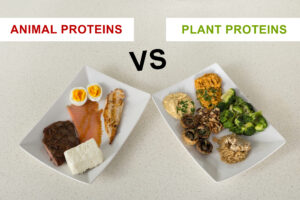 I will start with the “big picture” results from this study and then cover some of the important details.
I will start with the “big picture” results from this study and then cover some of the important details.
Average intake of:
- Total protein was 18.3% of calories consumed.
- Animal protein was 13.3% of calories consumed.
- Plant protein was 5.0% of calories consumed.
- Dairy protein was 3.8% of calories consumed.
When protein intake was divided into quintiles (5 equal parts) and women consuming the most protein were compared to those consuming the least protein for an average of 22 years:
- Those consuming the most total protein had a 7% increased risk of developing frailty.
- Those consuming the most animal protein had a 7% increased risk of developing frailty. (It is perhaps not surprising that the results were essentially the same for total and animal protein since animal protein was 73% of the total protein consumed by women in this study.)
- Those consuming the most plant protein had a 14% decreased risk of developing frailty.
- Consumption of dairy protein did not affect frailty.
Substituting as little as 5% of calories of plant protein for:
- Dairy protein decreased the risk of developing frailty by 32%.
- Animal protein decreased the risk of developing frailty by 38%.
- Non-dairy animal protein (meat, fish, and eggs) decreased the risk of developing frailty by 42%.
In addition, substituting as little as 5% of calories of dairy protein for non-dairy animal protein decreased the risk of developing frailty by 14%.
But, as I said above, the frailty scale used in this study included the criteria of developing 5 or more chronic illnesses, and long-term consumption of plant protein is known to reduce the risk of developing chronic illnesses. So, it is important to break the study down into its component parts. When that was done the statistically significant results were:
- Those consuming the most total protein had a 7% increased risk of low strength and a 25% increased risk of developing 5 or more chronic diseases.
- Those consuming the most animal protein had a 9% increased risk of low strength and a 35% increased risk of developing 5 or more chronic diseases.
- Those consuming the most plant protein had an 18% decreased risk of low strength. (It is interesting to note that plant protein consumption did not have a statistically significant effect on the development of chronic diseases in this study. That suggests that the “protective” effect of plant protein may simply be due to the absence of animal protein from the diet.)
- Consumption of dairy protein did not affect any of the frailty criteria.
Finally, prevention of strength loss due to age-related sarcopenia is known to require exercise as well as adequate protein intake.
So, it was somewhat surprising that no difference in the association between protein intake and frailty was seen in women with high physical activity compared with those with lower physical activity levels. However, this may be because the range in activity level between the women in this study was relatively small. There didn’t appear to be a significant number of “gym rats” among the women in this study.
What Kind Of Protein Is Best For You?
 One take-away from this study is clear. If you are a woman and want to minimize sarcopenia (loss of muscle mass and strength as you age), plant protein is an excellent choice.
One take-away from this study is clear. If you are a woman and want to minimize sarcopenia (loss of muscle mass and strength as you age), plant protein is an excellent choice.
- A variety of plant proteins is best, so you get all the essential amino acids.
- You don’t need to become a vegan. This study showed that replacing as little as 5% of your calories from animal protein with plant protein can have a significant benefit. Any healthy primarily plant-based diet will do.
- This study enrolled only women aged 60 or above, so we don’t know whether the results apply to men or to younger women.
We don’t know why plant protein is better than animal protein at preventing age-related sarcopenia.
- It could be because primarily plant-based diets are anti-inflammatory, and inflammation plays a role in sarcopenia.
- Or it could be because primarily plant-based diets reduced the risk of chronic diseases, and chronic diseases can lead to loss of strength.
To be clear, this is a study that focuses on the type of protein that is best for long-term health and strength as we age. This is not a study of the best protein for increasing muscle mass following a workout.
- Multiple studies show that whey protein can be a good post-workout choice.
- However, other studies show that plant protein can also be a good post-workout choice if extra leucine is added to make it equivalent to whey protein in terms of leucine content.
The Bottom Line
You have probably heard that it is all downhill after age 30. But it doesn’t have to be.
One of the downhill slopes we all face is something called sarcopenia (age-related muscle loss). The resulting loss of strength and agility can severely impact our quality of life in our golden years.
We can prevent sarcopenia with the combination of a high protein diet and resistance training (weight bearing exercise).
But what kind of protein is best? In this issue of “Health Tips From the Professor” I review a large, well-designed study that suggests plant protein is the best choice for women if they wish to reduce age-related muscle loss and the weakness that comes with it.
For more details about the study and what it means for you, read the article above.
These statements have not been evaluated by the Food and Drug Administration. This information is not intended to diagnose, treat, cure, or prevent any disease.
______________________________________________________________________________
My posts and “Health Tips From the Professor” articles carefully avoid claims about any brand of supplement or manufacturer of supplements. However, I am often asked by representatives of supplement companies if they can share them with their customers.
My answer is, “Yes, as long as you share only the article without any additions or alterations. In particular, you should avoid adding any mention of your company or your company’s products. If you were to do that, you could be making what the FTC and FDA consider a “misleading health claim” that could result in legal action against you and the company you represent.
For more detail about FTC regulations for health claims, see this link.
https://www.ftc.gov/business-guidance/resources/health-products-compliance-guidance
_____________________________________________________________________
About The Author
 Dr. Chaney has a BS in Chemistry from Duke University and a PhD in Biochemistry from UCLA. He is Professor Emeritus from the University of North Carolina where he taught biochemistry and nutrition to medical and dental students for 40 years. Dr. Chaney won numerous teaching awards at UNC, including the Academy of Educators “Excellence in Teaching Lifetime Achievement Award”. Dr Chaney also ran an active cancer research program at UNC and published over 100 scientific articles and reviews in peer-reviewed scientific journals. In addition, he authored two chapters on nutrition in one of the leading biochemistry text books for medical students.
Dr. Chaney has a BS in Chemistry from Duke University and a PhD in Biochemistry from UCLA. He is Professor Emeritus from the University of North Carolina where he taught biochemistry and nutrition to medical and dental students for 40 years. Dr. Chaney won numerous teaching awards at UNC, including the Academy of Educators “Excellence in Teaching Lifetime Achievement Award”. Dr Chaney also ran an active cancer research program at UNC and published over 100 scientific articles and reviews in peer-reviewed scientific journals. In addition, he authored two chapters on nutrition in one of the leading biochemistry text books for medical students.
Since retiring from the University of North Carolina, he has been writing a weekly health blog called “Health Tips From the Professor”. He has also written two best-selling books, “Slaying the Food Myths” and “Slaying the Supplement Myths”. And most recently he has created an online lifestyle change course, “Create Your Personal Health Zone”. For more information visit https://chaneyhealth.com.
For the past 45 years Dr. Chaney and his wife Suzanne have been helping people improve their health holistically through a combination of good diet, exercise, weight control and appropriate supplementation.

